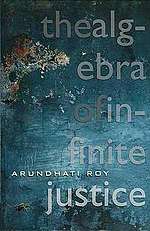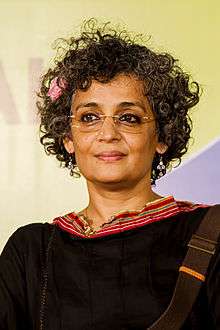The Algebra of Infinite Justice
The Algebra of Infinite Justice (2001) is a collection of essays written by Booker Prize winner Arundhati Roy. The book discusses several perspectives of global and local concerns, among them one being the abuse of Nuclear bomb showoffs.

(publ. Flamingo)
Published by the Penguin Books India, the book discusses several issues from fields as diverse as the political euphoria in India over its successful nuclear bomb tests, the 'power' politics wherein she discusses the power generating companies of the world manipulating the laws and policies of the many power-deprived nations. Mithu C Banerji , in a review in The Observer (2002) stated:
Roy's writing reflects her fiction, and meanders between polemic and sentiment. Yet whether she is talking about the 'death of my world' or about 'one country's terrorist being another's freedom fighter', she is always passionately intense.[1]
The official introduction to the book by Penguin India is :
- A few weeks after India detonated a thermonuclear device in 1998, Arundhati Roy wrote ‘The End of Imagination’. The essay attracted worldwide attention as the voice of a brilliant Indian writer speaking out with clarity and conscience against nuclear weapons. Over the next three and a half years, she wrote a series of political essays on a diverse range of momentous subjects: from the illusory benefits of big dams, to the downside of corporate globalization and the US Government’s war against terror.
Editions
- ISBN 0-14-302907-X (Penguin India)
- ISBN 0-00-714949-2 (Harper Collins)
- Mera Edition in Urdu (Amal Mohan)
- Hindi translation of this book is also available under the title - Nyaay Ka Ganit (न्याय का गणित). ISBN 81-267-1074-8. OCLC 500351747. (Rajkamal Prakashan)
References
- Banerji, Mithu C (16 November 2002). "Goddess of big things". Guardian. Retrieved 22 October 2016.
- ROY, ARUNDHATI. (2019). END OF IMAGINATION. [S.l.]: HAYMARKET DOYMA. ISBN 978-1642591095. OCLC 1091586431.
- McIntosh, Ian (September 1999). "Big Dams: Serving the Greater Common Good?". Cultural Survival Quarterly Magazine. Retrieved 22 October 2019.
- Roy, Arundhati (19 October 2001). "Indian Novelist and Activist Arundhati Roy Speaks On War, Terror and the Logic of Empire". Democracy now. Retrieved 22 October 2019.
- Roy, Arundhati (2002). Power politics (2nd ed.). Cambridge, Mass.: South End Press. ISBN 0896086690. OCLC 49230993.
- Roy, Arundhati (14 January 2002). "Shall we leave it to the experts?". Outlook. Retrieved 22 October 2019.
- Roy, Arundhati (20 October 2001). "War is peace". Outlook India. Retrieved 22 October 2019.
- Roy, Arundhati (17 June 2002). "War Talk When India and Pakistan conducted their nuclear tests in 1998, even those of us who condemned them balked at the hypocrisy of Western nuclear powers". The Nation. June 2002.
- Prasannarajan, S. (7 January 2002). "the end of dissent, book review of the Algebra of infinite justice". India Today. Retrieved 22 October 2019.
- Zaid, Mehraan (9 July 2006). "The Algebra of Infinite Justice It contains the best of Arundhati Roy's political writings". Hindustan Times. Retrieved 22 October 2019.
